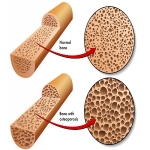If you think of our bodies as a house, our bones would be the framework. In other words, our bones serve to protect internal organs. It also allow us to move, store minerals, and provide our bodies with support. The bones internal structure is made of collagen and is similar to the appearance of a honeycomb. This allows them to be sturdy yet light weight. Today I am going to tell you about why bone health is important and what you can do to improve it.

Bones are always in the process of remodeling. To sum it up, this is when old bone is removed and new bone is formed. Once most people reach the age of 30, they have reached their peak bone mass. However, if our bones are not healthy they are removed quicker than they are replaced. Similarly the ability of the bone to be replaced decreases. Due to this, our bones become weak and be prone to fracture.
What is Bone Health?
Above all, your risk of having osteoporosis or osteopenia is related to the amount of bone mass you have gained by age 30. That is to say that the more bone mass you have stored, the less chance you have of having one of these disorders over time. A DEXA scan is a test used by healthcare providers to measure your bone density and subsequently your bone health.
What Affects It?
Several things that you can control are believed to increase your risk of poor bone health. First, a diet lacking in calcium and vitamin D leads to low bone density. Like muscles, bones become stronger with physical activity. In addition, regular exercise and maintaining a healthy weight can improve your bone strength. Furthermore, smoking and alcohol use also contribute to poor bone density and development of osteoporosis.

Anorexia Nervosa, Cancer, Cushing’s Disease,
Diabetes , Hyperthyroidism, Lactose Intolerance,
Liver, Lung, or Kidney Disease,
Multiple Sclerosis, Rheumatoid Arthritis
Can You Improve Bone Health?
YES! Many of the risk factors we’ve discussed are controlled by you. You should eat a diet that is adequate in calcium and vitamin D. This will help to prevent or slow down bone loss. Some examples of foods that are high in these minerals include dairy products, almonds, broccoli, and fatty fishes. The recommended daily allowance (RDA) for calcium is between 1,000- 1,200 mg a day. In the same vein, your body needs vitamin D to properly use calcium, and the RDA for vitamin D is approximately 600 IU’s daily.

Likewise, you should include weight bearing physical activity into your day. This can lead to improved bone strength and decreased bone loss. Walking, jogging, or stair climbing are all ways to use your body weight during exercise. You should also avoid substance abuse, such as smoking and excessive alcohol intake to help decrease your chance of developing poor bone health.
If you are a fall risk, speak with your doctor about beginning a weight bearing exercise program. Falling increases your risk of fragility fractures with people who have poor bone health.
Who Treats It?
We do! Kansas City Bone and Joint Clinic offers a bone health clinic at our Overland Park and Lee’s Summit locations. At this visit, you should expect to review your DEXA scan and any lab tests you have done. After that, a comprehensive history is taken. Based on this, it may be recommended that you have additional labs or tests completed to assess vitamin, mineral, and hormone levels.
In addition, nutrition education, lifestyle modification, and fracture prevention will also be a part of your visit. If treatment with medication is indicated, we will review medication options and explain the risks and benefits with these options. Administration of medication can be scheduled as well.
In conclusion, bone health is important because like a house, we depend on our internal structure for support. While your ability to improve your bone mass slows after age 30, there are still many factors that you can control that affect your bone health. Increased calcium and vitamin D intake, increased weight bearing exercise, and decreased substance use can all positively affect your bone health.
Follow up with one of our bone health specialists for an evaluation today!
Riki Duncan, MA. Ed
References
https://www.medicalnewstoday.com/articles/320444#Bone-remodeling

